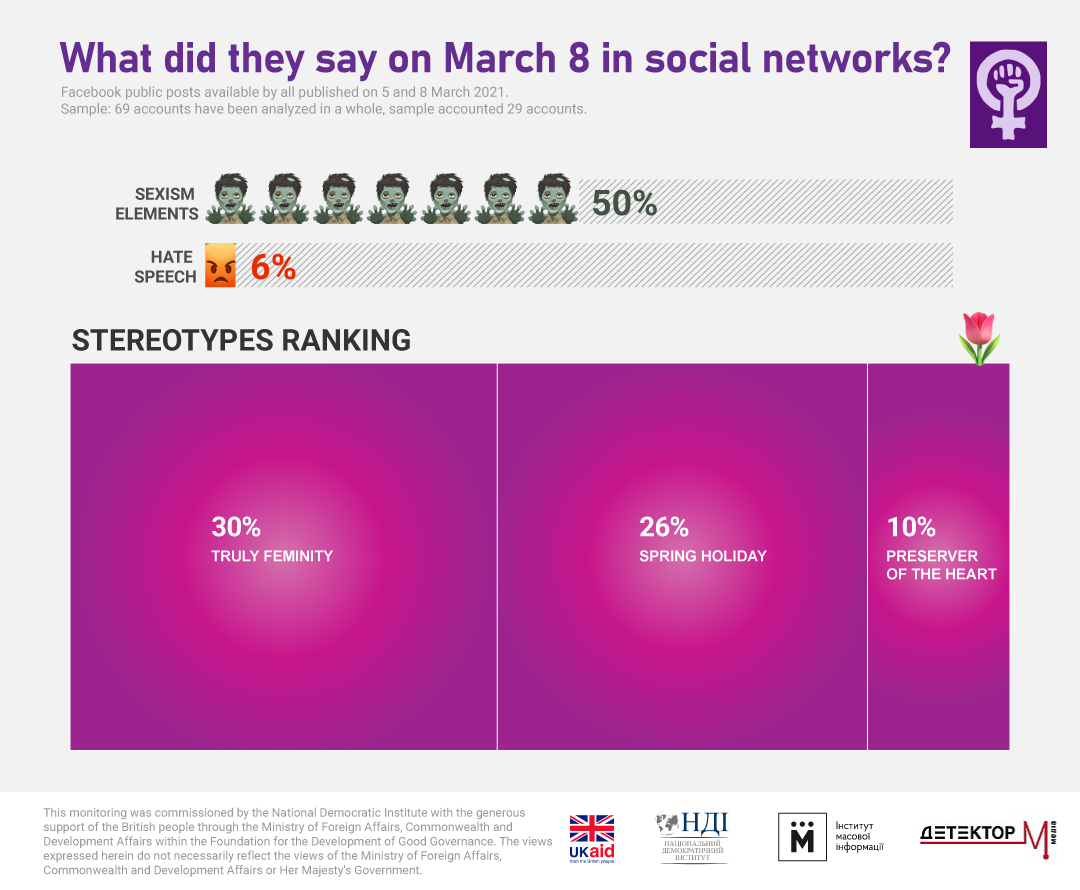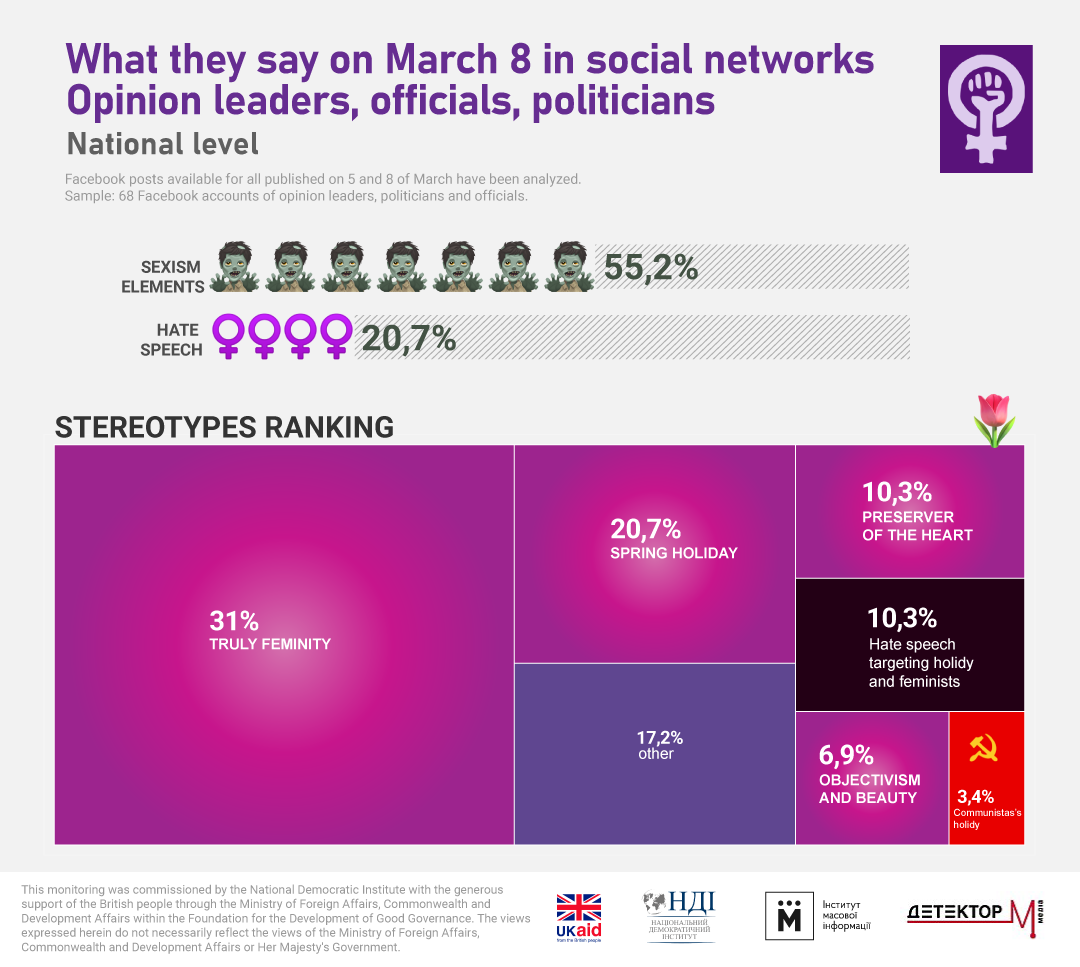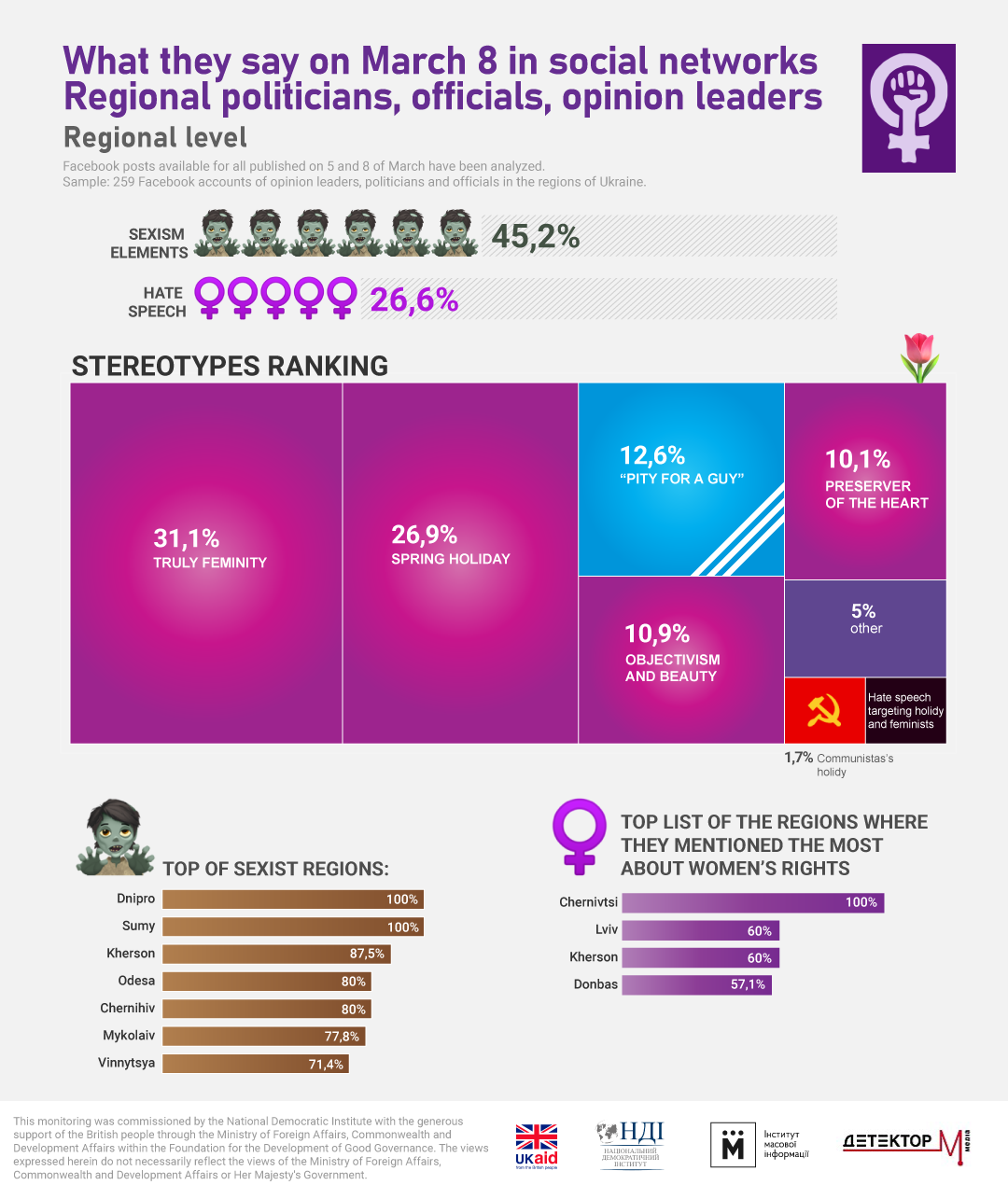“Dear women! I sincerely congratulate you on International Women’s Day, a holiday of spring, youth and beauty! Holding in reverence and saying our sincere gratitude to you for your wisdom, devotion and true love for life. Let spring blossom in your souls, give hope and faith in a beautiful future ! Be united and unique! Prosperity in all endeavors and deeds! Love, happiness, sunshine and triumph! “ Such a post was published on March 8 in the Telegram channel of the Minister of Education and Science of Ukraine Serhiy Shkarlet. Although the chorus of congratulations on the “holiday of spring and beauty” and wishes to “inspire men” is no longer as unanimous as in previous years, many government officials and public figures who can be considered opinion leaders broadcast the Soviet vision of March 8, which has nothing common to the true meaning International Women’s Day.
To find out how enduring stereotypes about March 8 are in Ukrainian society, at the request of the National Democratic Institute, the “Institute of Mass Information” and “Detector Media” monitored the content of the social network Facebook, forming a sample of top-ranking politicians and officials and public figures who could be seen as opinion leaders. This study complements the picture of gender imbalance in the content of Ukrainian media, clarified as a result of the February monitoring of IMI and DM.
The nationwide sample included 16 of the most popular video bloggers, 18 politicians and top officials who have the most followers on Facebook, 21 media people with the most followers on Facebook, 14 public experts and commentators, whom we rate as opinion leaders (69 men and women in total). Also, in 23 regions of Ukraine, we selected 10–12 public figures, whom we consider to be opinion leaders, and top officials and local government officials (a total of 259 men and women). These samples do not pretend to be sociologically representative, but are, in our opinion, indicative. This is confirmed by the approximately equal popularity of key stereotypes : “spring holiday”, “true femininity”, “preserver of the heart”, “you have to be beautiful”, etc. in the national and regional samples.
March 8, 2021 fell on a Monday. However, some officials and politicians published greetings on Friday, three days earlier. The tradition of greeting women and handing out tulips on the last working day before the holiday is another component of the Soviet concept of celebrating March 8, which, as we can see, has spread even on social networks. So we included posts on March 5 and 8 related to International Women’s Day, as well as gender issues in general in the analyzed content.
What we found out
About half of those selected for both national and regional samples wrote something on the occasion of March 8. At the same time, politicians, officials, and local government officials spoke almost all of them, and journalists, activists, and specialists in various fields often preferred to remain silent.
About half of the people who wrote at least something on the occasion of March 8 reproduced some sexist stereotypes or the “Soviet” concept of the holiday. Every fourth or fifth mentioned the rights of women and the true essence of International Women’s Day.
The most common stereotypes are “spring holiday” and “true femininity”. The first shifts the focus from women’s rights to the seasons: spring, sun, flowers, and so on. The second mentions expectations (usually men’s) about the look, behavior, and role in the family and society that women must meet. In particular, women are credited with being weak and “inspiring” men. A separate popular stereotype is the “preserver of the heart”, who sanctify motherhood and the household as special roles assigned to women by God or nature.

We called a separate category of posts, which was especially evident in the regional opinion leaders, “sorry for a boy”: irony, sarcasm, more or less covert aggression against women and everyone who sees an opportunity to talk about women’s rights on March 8.
Some of the posts were “hybrid”: their authors combined mentions of spring, beauty, tenderness, weakness and subordination of women with maxims about equality, rights and the ability of women to be full members of society. Diplomatic opinion leaders in particular suggested that women interpret the holiday themselves and wish themselves whatever they wanted.
There were many exceptions in both samples – public figures, politicians, even two heads of regional state administrations, who emphasized women’s rights, the pursuit of equality of opportunity, and the problems that women face in modern Ukrainian society.
But we must say that for an average Ukrainian official, politician or local government official, it remains normal to define a woman as a “personification of beauty” who should “inspire men” to their serious deeds.
Attempts to devalue International Women’s Day as a “communist holiday” were in both samples, but did not become a trend, as did letters from pro-Russian politicians about how they “defended” March 8 and did not allow it to be abolished.
Nationalwide opinion leaders
29 of the 69 people whose Facebook pages were included in the sample wrote something on the occasion of International Women’s Day on March 5 and / or 8. Of these 29, just over half transmitted sexist stereotypes, and only one in five mentioned women’s rights.
Politicians / officials were the most productive – 14 out of 18 wrote something on the occasion of March 8, and every second had signs of sexism in the posts. The most restrained were the journalists: out of 21, only three spoke out, and sexism was seen in only one post.
Among the stereotypes in these posts, “true femininity” is the most common. Men tell women what they need to be to meet men’s expectations and “complement” men.

” Dear women, happy holidays to you! Be healthy, happy and successful!” – writes Andriy Portnov, the former ally of Victor Yanukovych.
“A woman should inspire, admire and she shouldn’t do anything else,” jokes (or not?) showman Dmitry Chekalkin, occasionally mentioning “the corners of your lips.”
” Women’s beauty, intelligence, wisdom and perfection have become an inspiration for artists and warriors for centuries, moving the wheel of history,” – poetically formulates former Prime Minister Arseniy Yatsenyuk, reducing the role of women in human history to the stimulant of male senses.
Politician Oleh Lyashko in his “witty” greeting reduced the needs of women to three points: ” What do women need for happiness? Her husband to come home fromwork with money, her kids could be sent to kindergartens and schools, to be treated not for the fortunes. That’s the above all else . ” If Mr. Lyashko sometimes goes outside the studios of Rinat Akhmetov’s TV channels and speak to people, he will find out that many women earn their living by themselves, and do not wait for their husbands to bring money. In another post, Lyashko voices another wish: ” I sincerely congratulate all our charming, best women – wives, mothers, grandmothers – on the Feast of Spring. May spring always be in your soul!”
In fact, the “holiday of spring” is another common stereotype that occurred in every fifth post. This is a substitution of concepts, when instead of the true meaning of International Women’s Day, they talk about spring, flowers and warmth (although March 8, 2021 was, frankly, cold). “They thwart a lot abound today’s holiday, and let them continue. But there is no dispute that we all need a real Spring. Easy, light, with sunlight, the riot of nature, the scents of flowering trees ,” wrote Arseniy Yatsenyuk. Oleksiy Arestovych, a spokesman for the Minsk Group, also calls March 8 a “holiday of spring .” For LB.ua editor-in-chief Sonya Koshkina, the meaning of March 8 was reduced to “flowers and spring.”
We see this stereotype in the letter of the MP from “Opposition platform – For life” Vadym Rabinovich who writes: ” Dear women !!! Thank you for everything !!!! Since March 8 !!! We love you !! ! We defended this holiday !!! After all – without you – it is impossible !! Happiness and kindness !!! “It is difficult to tell, what achievement Vadym Rabinovich means under” defended “. No one planned to cancel International Women’s Day; The Institute of National Remembrance in 2017 proposed to replace the day off on March 8 with the 9th – Shevchenko Day, but there was no question of canceling the holiday . The bill on this lay in the Verkhovna Rada for three years and was withdrawn .
“I congratulate our charming and beautiful women and girls on a wonderful Holiday of Spring, Beauty and Love !!!!” – writes a colleague of Rabinovich, politician and regular of pro-Russian TV channels Dmitry Spivak, adding that ” no vyatrovichs and other political impotent men will not spoil our festive mood in their fantasies about Rosa and Clara.” Pro-Russian blogger woman “Strana.ua” Olesya Medvedev also wrote about “failure to de-communisation” of March 8 “Newswire is full of flowers and bright pictures of greetings, Hundreds of greetings in my e-mail. This is great outcome of the effectiveness of work Vyatrovych, Drobovych, and other decommunizators, as well as all followers of the idea of combating International Women’s Day” The ideas about Volodymyr Vyatrovych are felt so obsessive in Olesya’s mind that she jokes in a separate post about the need to congratulate the MP Vyatcrovych on March 8 (pro-Russian public figure Tetyana Montyan also joked). At the same time, Medvedeva notes that she perceives this day differently, but does not specify exactly.
The media professional Konstantin Stogniy, after a long preface about people seeking for interpretations on March 8 in the past, writes: “… I join the vast majority of men who are ready to use any occasion to give women joy!))) And the first days of spring are a good reason for that. Happy Holidays, dear Women and Girls, familiar and not very! Happiness, Health and real men around! “
The leader of the Batkivshchyna party Yulia Tymoshenko presented a whole variety of stereotypes to women. ” Well, how can this holiday be ignored? It’s about love, tenderness, beauty. About the first spring rays, the first catkins on birch-trees, the first flocks of cranes in the sky “, – she writes and calls “motherhood and femininity” invisible forces capable of all. Not a word about rights, only harmony and comfort that should prevail in homes thanks to women.
President of Ukraine Volodymyr Zelensky tried to slip between the drops, telling women that they are not the gentler sex, but did not restrain himself and portrayed women as a “catalyst” that makes men of full value: ” Without you, we are just biological creatures. With you we are humans and individuals .” He also resorted to objectification, praising the “beautiful eyes” of women, and made it clear to women who for one reason or another do not have (or perhaps do not want to have) a relationship that something is wrong with them: ” let the morning flowers, coffee in bed and a passionate kiss will also be an integral attribute of all 365 days. And may all these days your magical eyes be filled with happiness, love and spring . ” Mr Zelensky, and what about the ratification of the Istanbul Convention ?
However, the Speaker of the Verkhovna Rada Dmytro Razumkov should be recognized as the champion in the art of sleeping-between-the-droips greetings. ” Every woman puts her meaning into this day. I wish you to get what makes you happy. Happy holiday! ” he wrote, posting a picture with tulips and the Verkhovna Rada building. It is possible that women will choose not the flowers, but the Verkhovna Rada, because only 20% of people’s deputies in the Ukrainian parliament .
Politician Boryslav Bereza also tried to combine the protection of women’s rights with a “holiday of beauty” in a lengthy post . ” Let’s at least admit to ourselves that you are real superheroines who work miracles every day from the birth of children to the saving of companies from the crisis, from creating peace in the family to scientific discoveries or cooking borscht, from kissing to words of support. You are Universe!” he addresses the women. In another post, he mocked the initiative of the Servant of the People party to create a women’s movement ( whose goal is to protect women’s rights and promote women’s involvement in politics), recalling the sexist statements of members of this political force.
There are other examples. The leader of “European Solidarity” Petro Poroshenko managed to respect the balance between compliments and respect for women by, who, however, did not mention women’s rights. But the leader of the “Voice” Kira Rudyk stressed the need to fight for women’s rights.
Writer and veteran of the war in Donbass Valery Marcus congratulated readers on the International Day for Women’s Rights and International Peace. TV presenter and blogger Yanina Sokolova urged an imaginary reader to ” buy herself this fucking bouquet ” and not wait for March 8. Journalist Vakhtang Kipiani gave adequate response to jokes about “Rosa and Clara”: ” When they started their struggle, there was no life insurance and workers, there was an eight-hour day, there were no restrictions on child labor and labor pregnant, no minimum wage etc. And this is the case when you don’t want to thank – just think where it all came from . ” Videographer of hromadske.ua Bogdan Kutepov spoke against domestic violence and called for respect for women.
Regional opinion leaders
Of the 259 pages included in the sample, 124 were related to March 8. Of these 124, 45% reported sexism, a quarter mentions of women’s rights. That is, in general, the ratio is slightly more optimistic than at the national level: the percentage of those who write about rights is slightly higher, and the number of sexists is slightly lower.
However, in some regions, the relationship between conditional “sexists” and “human rights defenders” is disappointing. For example, in Dnipro and Sumy, all greetings in the sample showed signs of sexism; in Kherson they were in 87.5% of posts, in Odessa and Chernihiv – in 80%. At the opposite pole were Chernivtsi (all posts mentioning March 8 – women’s rights), Lviv (60% of posts – about women’s rights) and Donetsk region (57%). Of course, the regions should not be judged by these figures, as much in some regions depended on a relatively small sample, in which we included opinion leaders and local top officials. But there are certain patterns. Thus, in 9 out of 23 oblasts (40%) the heads of region state administrations resorted to open sexism in greetings.

” Honey, dear, charming, ” – says the head of the Transcarpathian Regional State Administration Anatoly Poloskov. His post is dedicated to women who ” save the health and lives of our loved ones ” every day : doctors. It would be appropriate to thank doctors (and not only women, but also men) on another day, and on March 8 this is a little about something else.
” Dear guardians!” – we read in the greeting of the head of the Odessa regional state administration Sergey Grinevetsky. He does not deny women the right to have independent goals and achievements, but reminds them that they should ” be great housewives, loving mothers, caring wives” and outlines the expectations that a woman must meet in the male world: ” Business, strong and at the same time gentle and a refined woman is already a symbol of the epoch “. And tells women to ” shine, surprise and inspire .”
The head of the Volyn Regional State Administration Yuriy Pohulyayko published a whole set of stereotypes : ” You adorn our world, impress us with your sincerity, refined femininity and amazing wisdom. We don’t cease to be surprised at your beauty, (…)You are inspiring power of men, the true support of life and the great responsibility. By your nature you give meaning to our lives, inspire new achievements, creativity and success, encourage us men to move forward and improve . ” The post has many epithets that refer to the female supporting role in the lives of “real people” – men, as well as beauty and tenderness. But not a word about women’s rights.
Secondary role for women in society – “to inspire” men – is voiced by the head of Zhytomyr Regional State Administration Vitaliy Bunechko: ” Thanks to you – our mothers, wives, daughters, sisters, friends, colleagues, we become stronger with you strive for new frontiers in life and work “. His Mykolaiv colleague Vitaly Kim orders women to be beautiful, and Poltava Oleg Sinegubov claims that ” men become the best next to women “, and women are ” personification of love “.
Although there are positive examples among the heads of regional state administrations. Anna Kovalenko, who heads the Chernihiv Regional State Administration, wrote that March 8 was ” another reason for her to draw attention to the struggle of women for the right to be equal participants in public, political and public life .” The greeting of the head of the Donetsk Regional State Administration Pavlo Kyrylenko is of the same spirit . His Lviv colleague Maksym Kozytskyi made his greeting as neutral as possible, and Chernivtsi’s Serhiy Osachuk put women’s rights first and even mentioned equal pay (wow!), But in the end he got lost in ” love and admiration “.
Local government officials keep path with the heads of regional state administrations. The mayor of Kropyvnytskyi, Arkady Raikovych, says: ” Thank you to everyone who takes care of children, teaches, heals, who pleases us with his work and, of course, who does not regard one’s life at the front. And all this is our lovely, charming women .” He also claims that “a woman is always spring “. His colleague from Uzhgorod Bogdan Andrew also sees the woman of jewel for a man’s life, not a person by herself, ” Always be healthy, beloved, inspire their smiles and succeed! Thank you for making our lives brighter and happier! ” Odessa Mayor Gennady Truhanov finds for a woman the right to dedicate her life not to her family, but to her favorite cause, but his compatriot, Oleksiy Yeremytsia, a deputy of the City Council from the Opposition Platform for Life, congratulated the women on ” spring ” and tells women: “Take exercises for yourself and your men!” The mayor of Nikolaev Alexander Senkevich though seems to try to break stereotypes with the message, all the same writes about “the huge responsibility which lies on fragile shoulders of our women “. The mayor of Vinnytsia Sergey Morgunov managed to pack the maximum number of markers of sexism in one sentence: “Wisdom, beauty, ability to give support, responsibility and diligence in work and real keepers family comfort and warmth – this is the beautiful half of our city . “The mayor Trostyantsa Heorhiy Bova in its full of sexist clichés greeting wants women” good fortune, reliable man’s shoulder, good luck in all endeavors, many flowers – delicate and fragrant “, although the next post on his page reprint another post about women’s rights (!). And the mayor of Sumy gave flowers to women on the street before the camera online.
Deputy Chairman of the Kherson Regional Council Yegor Ustinov seems to mention at the beginning of the post that for “someone” it is a day of struggle for rights, but then it comes to ” you are our support and our wings, a symbol of Home and Independence, only thanks to you a man can feel really needed . ” In the same spirit, the mayor of Dnipro Borys Filatov says: ” Your tenderness and beauty inspire. Fragile and strong at the same time, you take care of families, create comfort in our homes and motivate you to become better every day – to be worthy of youIt should be noted that politicians and officials are a minority in the monitoring sample, but most of the examples of sexism, objectification, humiliation of women in society and the transfer of arrows from women’s rights to “spring and tulips” were provided by them. Other opinion leaders are activists. journalists, doctors, artists, and priests spoke on average much more adequately.
“Spring Holiday” and “true femininity” are the most common stereotypes in the posts of regional opinion leaders. However, we have singled out another funny stereotype – let’s call it “sorry for a boy”.
On March 8, Kharkiv businessman Yuriy Sapronov wrote two posts about how men try to please women on “their” day. ” Hard day. Come to see, dear, beloved, honey. Today we cooked dishes, salted clothes, bought garbage, washed lunch, stroked flowers, watered the cat, cleaned the cake, took out the bath, planted vodka, swept the children ,” jokes the businessman, occasionally broadcasting stereotypical notion of “inhuman” work. In another post, he jokingly attributes all the housework to men.
Ternopil blogger Volodymyr Gevko puts the responsibility for preserving the tradition of giving gifts on March 8 to women, they say they demand gifts: ” The stereotype of a generous man is actively supported even by smart, active and young women. A man should give gifts. And signs of attention. Signs of attention. And signs of attention as gifts. A stingy man is worse than an alcoholic . “
A public figure from Khmelnytsky, Oleksandr Zoryan, reprimands women, asking if a man took an iPhone loan for any of them. Transcarpathian activist Vitaliy Gregor publishes witty memes: a hysterical woman who quarreled with her husband in her dream, and a woman who demands gifts for March 8. Chernihiv coach Serhiy Petrykei regrets that he cannot to offer baby-scribbles to one’s wife, like he did when he was child giving it to his mom, and film a humorous video instruction on how a husband should take a full part in the household. ” Pity the guy ” is his comment to the video, in which a woman hits a punching bag because, they say, she did not receive tulips on March 8.
His compatriot activist Oleksandr Gaspar emphasizes that women have a “changeable mood”, and in another post he reduces the struggle for women’s rights to a scene of sexual domination. A blogger from Chernihiv, Mykhailo Ilyashyk, entertains his subscribers with a picture in which a dragon woman scratches eight-March tulips from a man. It’s all a joke, but they feel annoyed, resentful, sarcastic and skeptical about the original meaning of International Women’s Day. Although there are serious “attacks” on the true essence of the holiday: in particular, Lviv priest Justin Boyko published a link to the material criticizing the idea of gender equality and the idea that it is the man who should be the head of the family and the woman should obey him.
In almost every region there are examples of constructive and adequate messages about March 8 as a day of struggle for women’s rights. People’s Deputy Solomiya Bobrovska from “Voice” quotes the woman poet Olena Teliga, who reflected on the equality of women and men. Oleksiy Matsuka, an editor of the Dom TV channel in Donetsk, called on his subscribers to vote for the most prominent women in Ukrainian history. Journalist Hanna Murlykina from Mariupol announced a flash mob about the idea of the visibility of women in a city designed by a woman architect. Former Deputy Prime Minister Gennady Zubko writes about women’s rights, which must be defended not only on March 8, but all the days. Athlete from Ternopil Lilia Prots told, how she won the right to do powerlifting, overcoming the stereotype that the barbell is not for women. Mykola Molozhon , a spokesman for the Starobilsk District State Administration , explains why, in his opinion, the Soviet Union changed the meaning of women’s holiday, and urges to love and please women regardless of the holiday (although he finally congratulates them on the “spring holiday”). Several articles by both men and women were attempts to desecrate September 8 as a “communist holiday,” but this did not become a trend.
Sometimes it is better not to be silent
Perhaps on March 8, it seemed to you that your entire Facebook feed had turned into a non-stop debate about the content and form of the women’s holiday, photo reports from women’s marches and women’s rights demonstrations. This study allows you to see the wider picture and make sure that everything is wrong outside the “bubble”. Most opinion leaders who identify topics for discussion on social media, offer frames for seeing different problems and ways to solve them, did not write anything about March 8. Although among them, as can be assumed and as evidenced by the posts of those who did not remain silent, there are the most of supporters of the celebration of International Women’s Day who take it as an opportunity to talk seriously about women’s rights.
Instead, almost no top local government official, politician, or official was silent. And almost all of them, according to the Soviet and post-Soviet tradition, which moved from wall newspapers and the district press to the Internet, voiced sexist stereotypes in line with the “holiday of spring and beauty.” Even those responsible for education, science and the humanitarian development of the state (yes, and the Minister of Culture among them !) offer women the tulip and the secondary role of guardian and inspirer of men, instead of equality and opportunities for self-realization.
But this can be changed – and the signs of these changes are already visible. Some officials, politicians and politicians use the occasion of March 8 to talk about women’s rights. The examples of the head of the Chernihiv Regional State Administration Anna Kovalenko or the Minister of Finance Serhiy Marchenko, who took part in the Women’s March , are still rare, but next year there may be more – until they give up tulips and “fragile shoulders”. To do this, it is important for people who understand the essence of International Women’s Day and the problems of women’s rights in Ukraine and the world to express their position – and not only on March 8.
This monitoring was commissioned by the National Democratic Institute with the generous support of the British people through the Ministry of Foreign Affairs, Commonwealth and Development Affairs within the Foundation for the Development of Good Governance. The views expressed herein do not necessarily reflect the views of the Ministry of Foreign Affairs, Commonwealth and Development Affairs or Her Majesty’s Government.
Institute of Mass Information, Detector Media



